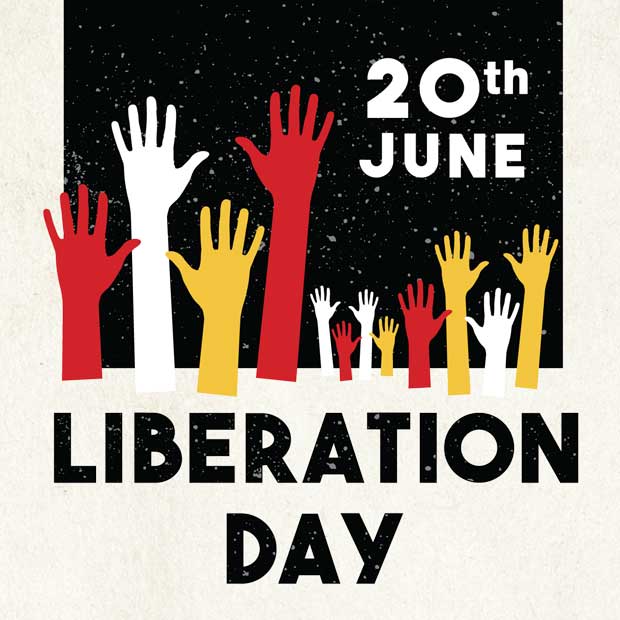17 Jun 2016 | Magazine
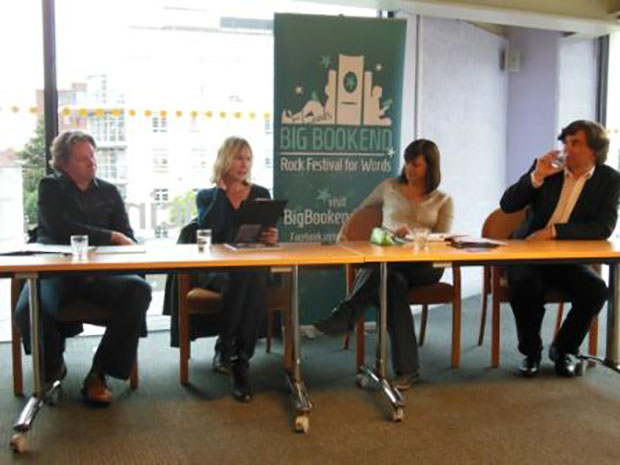
Chris Bond, Yvette Huddleston, Rachael Jolley and Anthony Clavane
Photos: Fiona Gell/The Leeds Big Bookend Festival
The Index on Censorship Big Debate took place at the 5th annual Leeds Big Bookend Festival this week, where journalists and authors were invited to discuss which has the biggest impact: journalism or fiction. Index’s magazine editor Rachael Jolley was joined by assistant features editor of The Yorkshire Post Chris Bond, Yorkshire-based journalist and author Yvette Huddleston and author of the award- winning Promised Land Anthony Clavane to explore which medium is more influential and why, as part of a series of Time To Talk debates held by Eurozine. Audio from the debate will be available at Time to Talk or listen below.
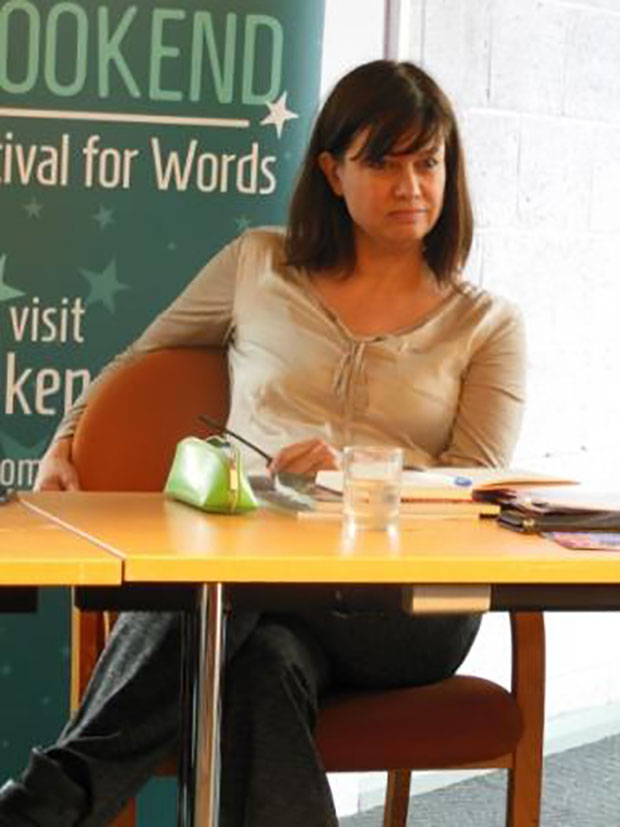
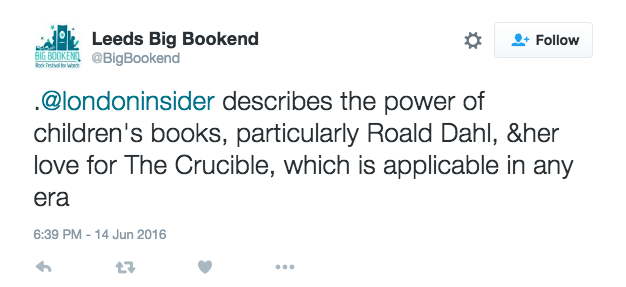
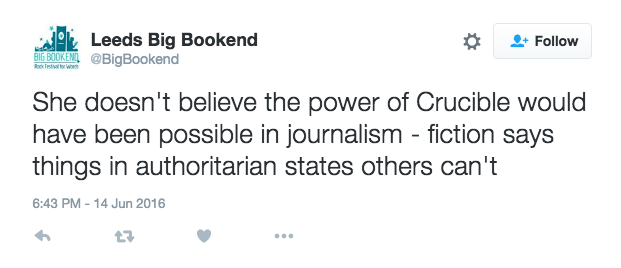
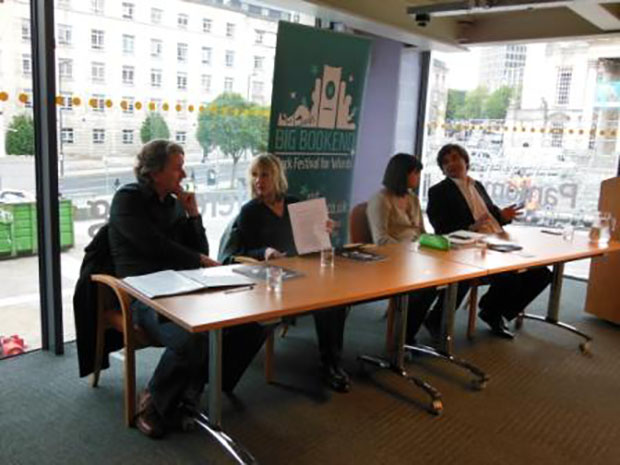
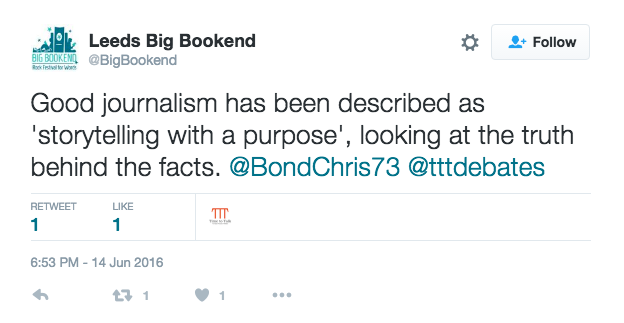
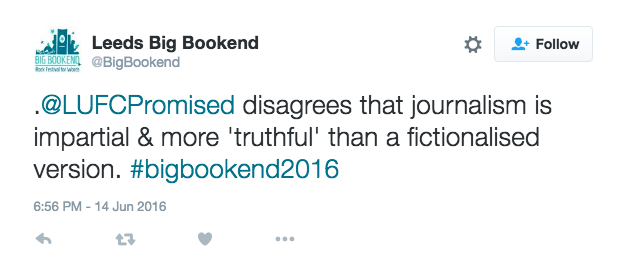
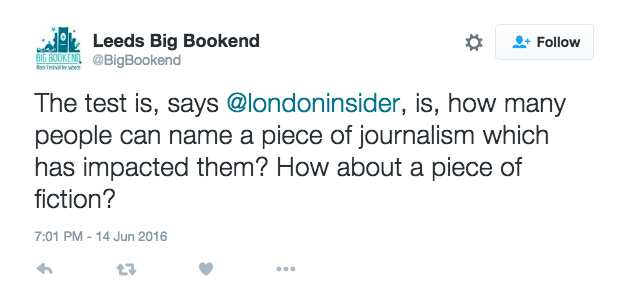
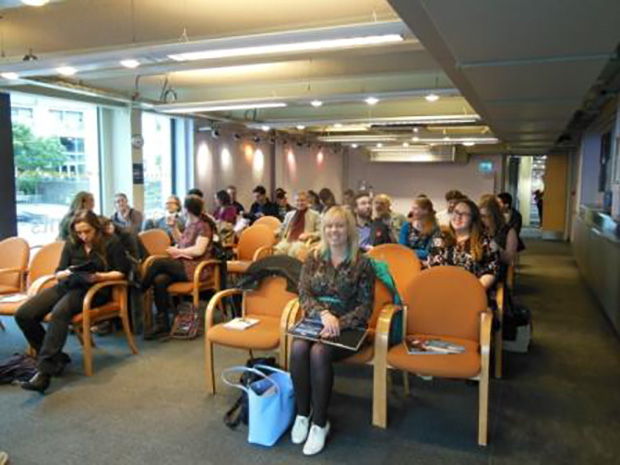
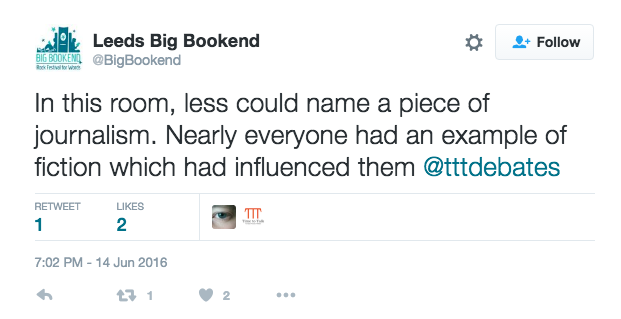
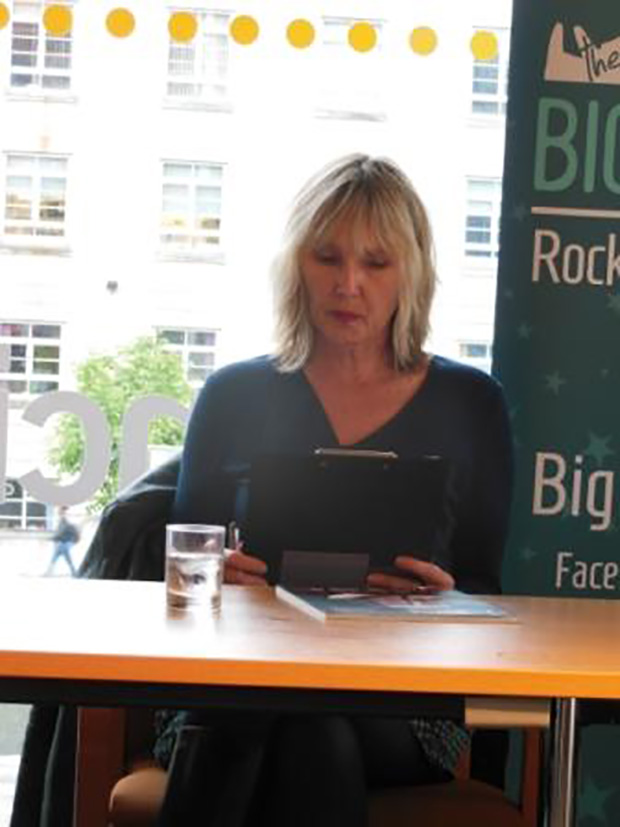
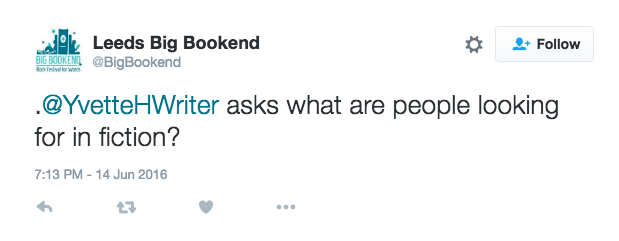
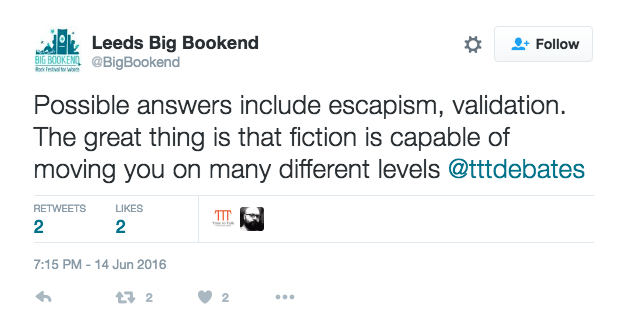
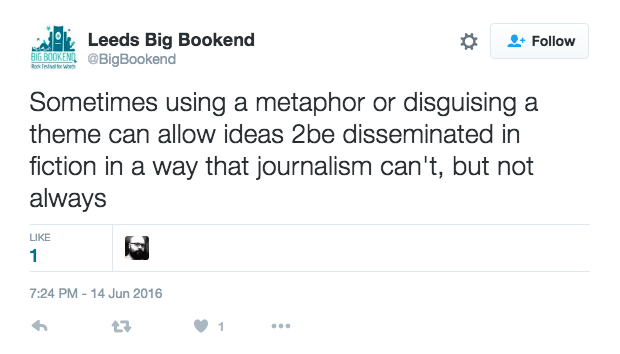
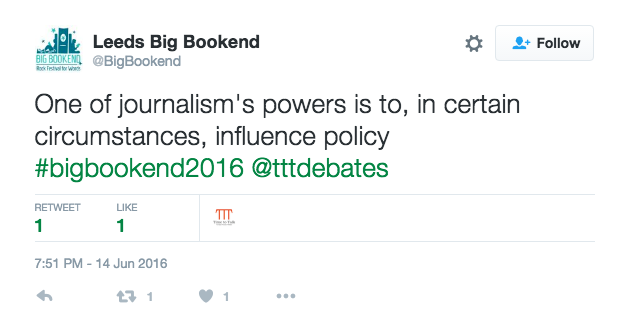
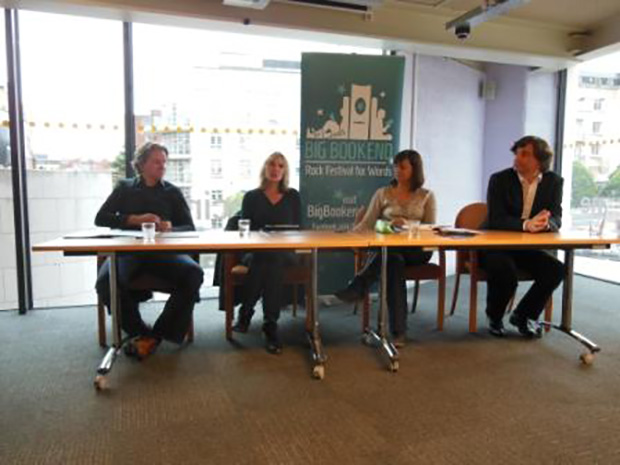
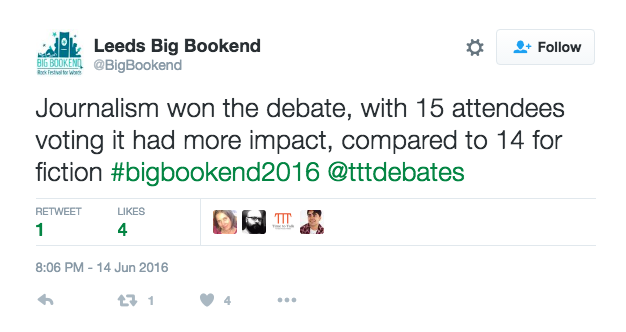
17 Jun 2016 | Middle East and North Africa, mobile, News and features, Saudi Arabia
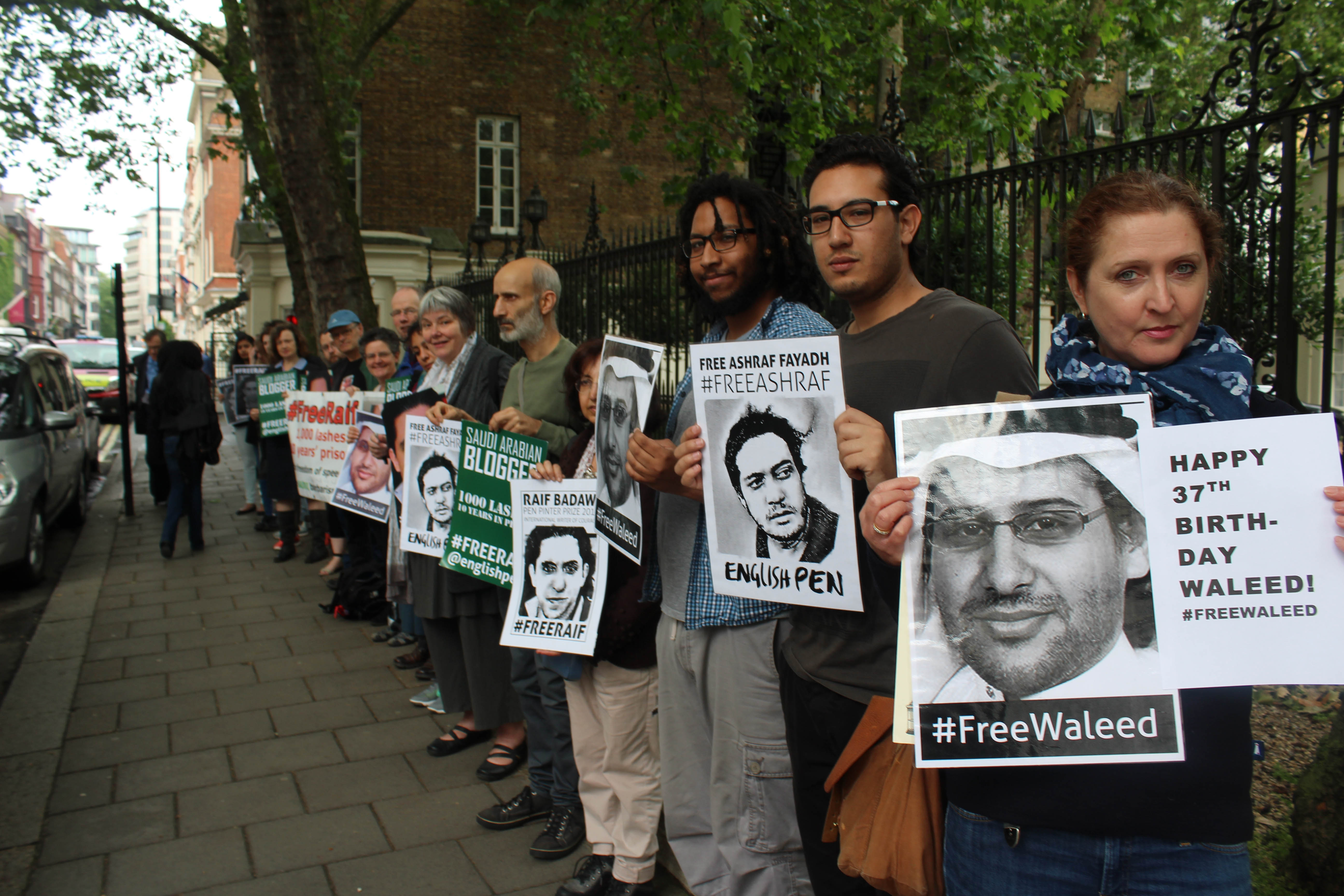
Credit: Cat Lucas, English PEN
Index on Censorship joined English Pen and several other organisations on Friday outside the Saudi Arabian embassy in London to call for the immediate release of Raif Badawi. The Saudi blogger was arrested four years ago on 17 June 2012. He was subsequently sentenced to 10 years in prison and 1,000 lashes for creating the website Free Saudi Liberals and “insulting Islam through electronic channels”.
Badawi received his first 50 lashes in the port city of Jeddah on Friday 9 January, after which the world took notice. The attention has been invaluable in delaying the remainder of his lashing, which his wife Ensaf Haidar says he won’t be able to survive.
Ahead of the demonstration, English Pen and the Raif Badawi Foundation for Freedom have been asking his supporters around the world to take action, including sharing a photo of themselves holding a poster of Raif or a message of solidarity.
It is crucial that we continue to take a stand against the Saudi government’s treatment of Raif Badawi. Index spoke with several of the protesters in London.
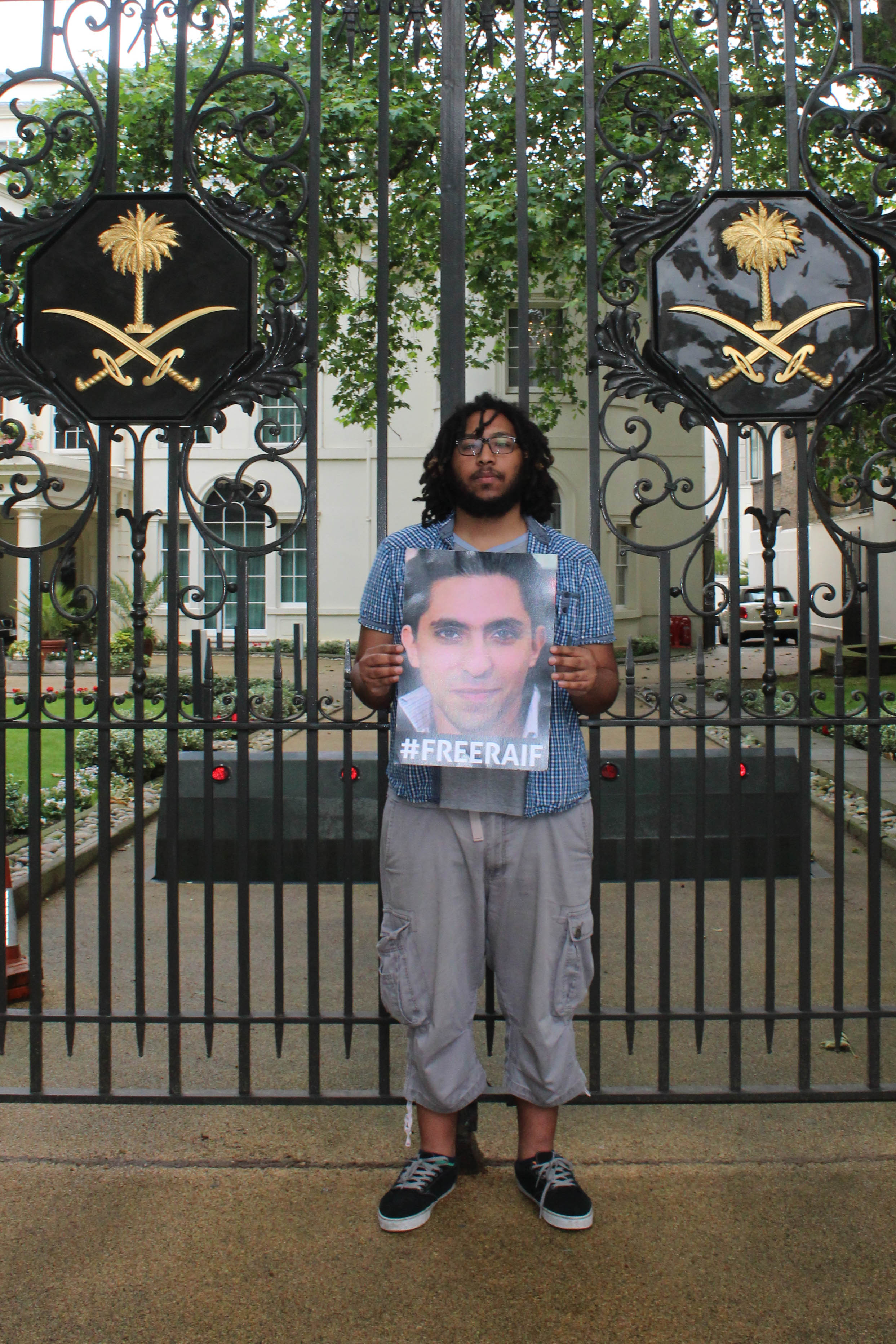
Credit: Cat Lucas, English Pen
Imad Iddine Habib, spokesperson of the Council of Ex-Muslims of Britain
“I come from Western Sahara and I’m here today because I knew Raif Badawi through his writings, have been to his websites and I know his family. This campaign is very close to my heart. Raif is in prison for writing and offering a space for a lot of Saudis that don’t fall in line with the thinking of the regime and the conservatives. I would hope to see more and more people stepping up to call out Saudi Arabia and the oppressive and anti-human rights laws they are implementing. Increasingly these laws are used against atheists and free thinkers, who are being judged as terrorists.”
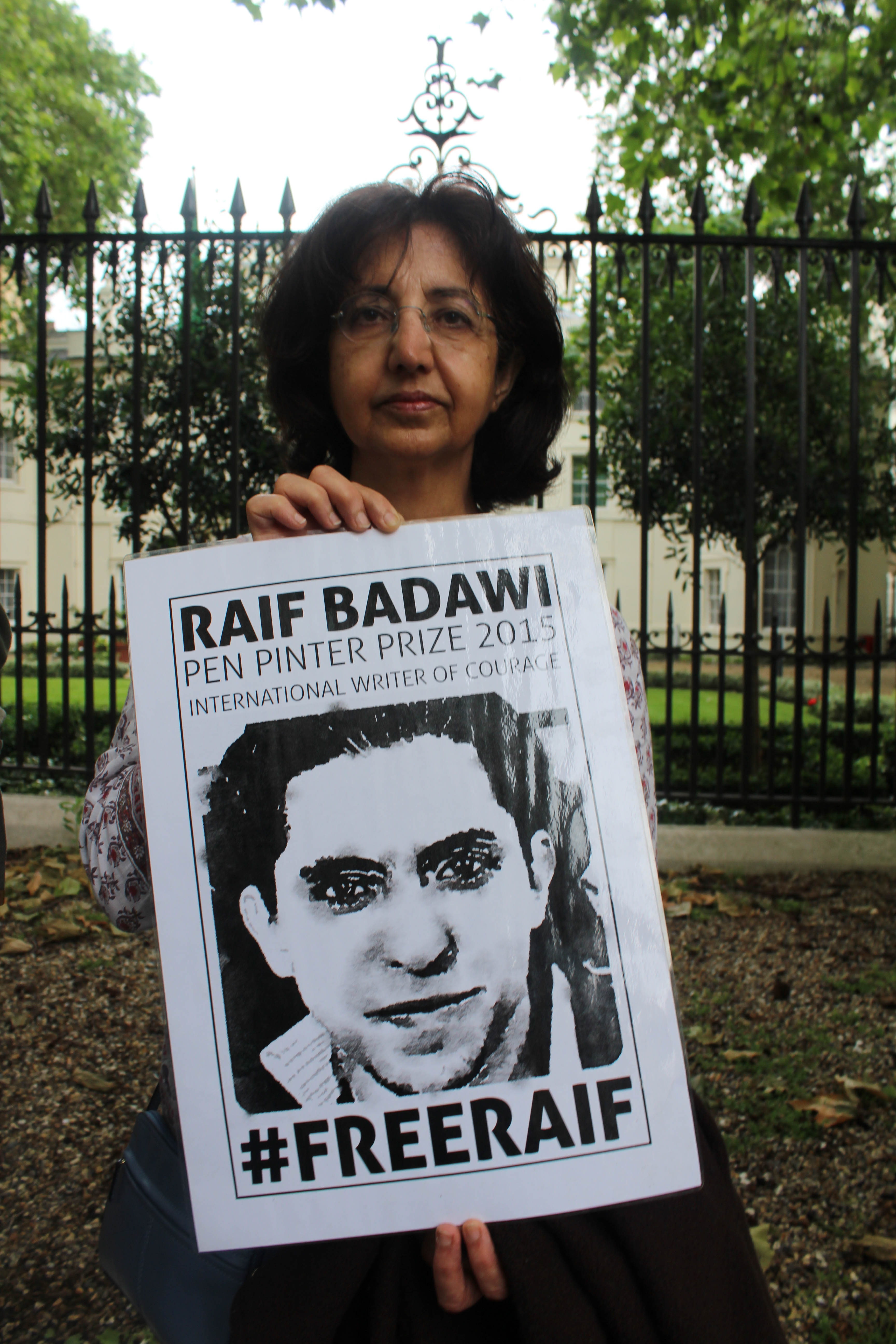
Credit: Cat Lucas, English Pen
Ravinder Randhawa, novelist
“As a writer, I feel that freedom of expression is the most important freedom that humanity has. In all societies, dialogue and discourse are the manners in which we examine ourselves and move forward. Raif was doing precisely that. He was encouraging dialogue and debate which was peaceful and non-harmful, and his punishment is unjustified and barbaric. Raif is a great person for speaking out regardless of the consequences. I’m here to support his cause and the cause of many other writers who are imprisoned. I’m here as a writer in solidarity with another writer.”
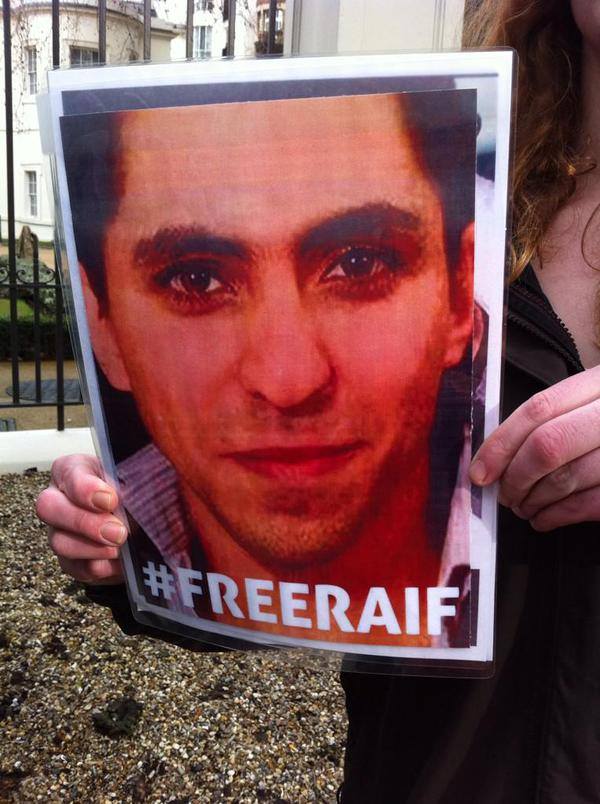
Credit: Cat Lucas, English Pen
Cat Lucas, English Pen
“Unfortunately, here we are outside the Saudi embassy – again. We’ve been coming here for 18 months in support of imprisoned blogger Raif Badawi, firstly with 20 consecutive weekly protests following his lashing, and now we protest here monthly. Today not only marks the fourth anniversary of Raif’s arrest but his lawyer Waleed Abulkhair’s 37th birthday. Waleed is serving a 15-year sentence. We are here to continue to call on the authorities to release them both, which is now more important than ever as we have learned this week that both have been hospitalised following a hunger strike. We know these protests are a really big deal for them.”
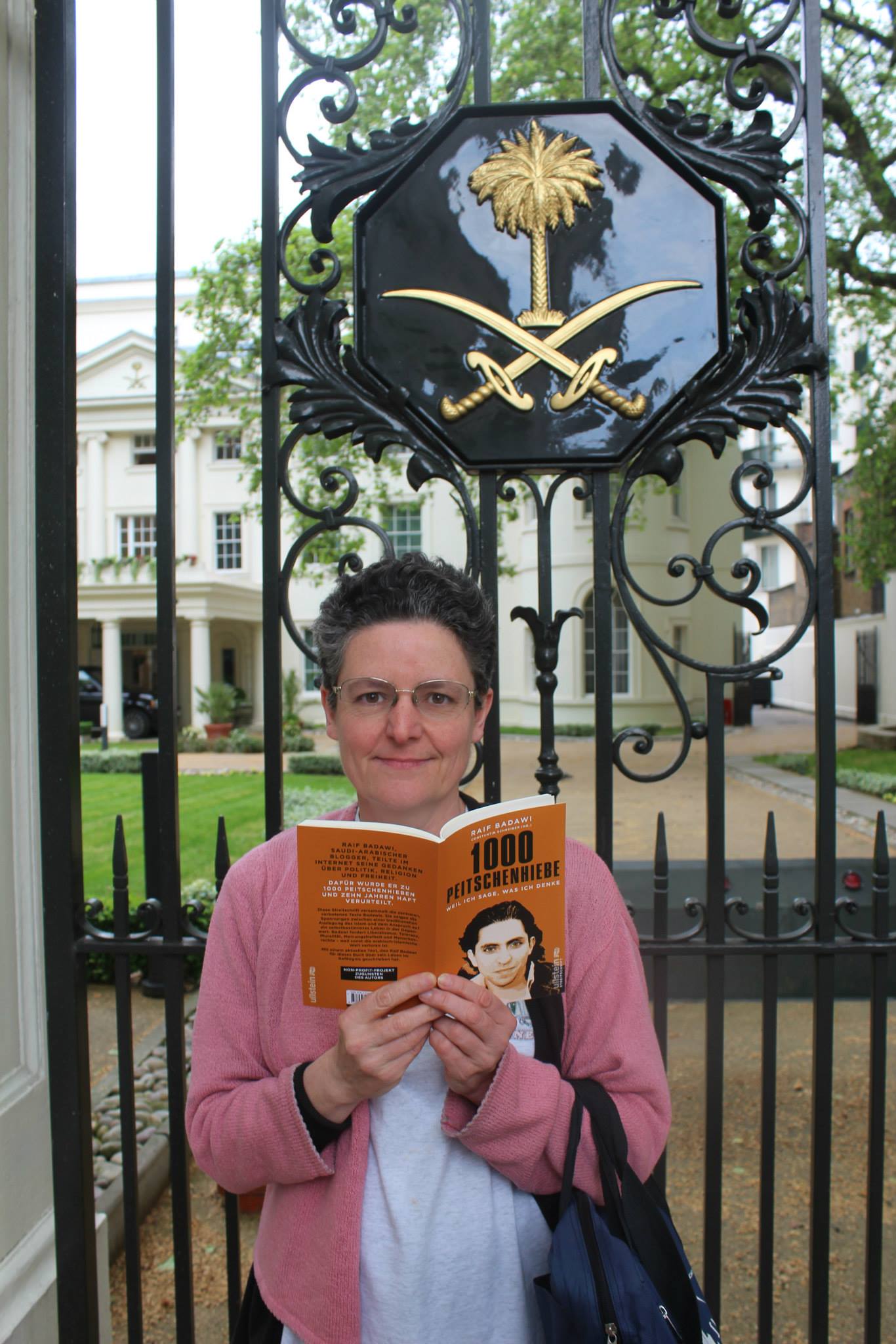
Credit: Cat Lucas, English Pen
Susan Dorrell, Activist
“I come here quite frequently — I’m one of the regulars. It’s very important to stand up for freedom of expression and Raif symbolises thousands of people across the world who suffers persecution as a result of expressing a peaceful opinion. He’s a victim of religious-led persecution and anyone who believes in free speech should support him.”
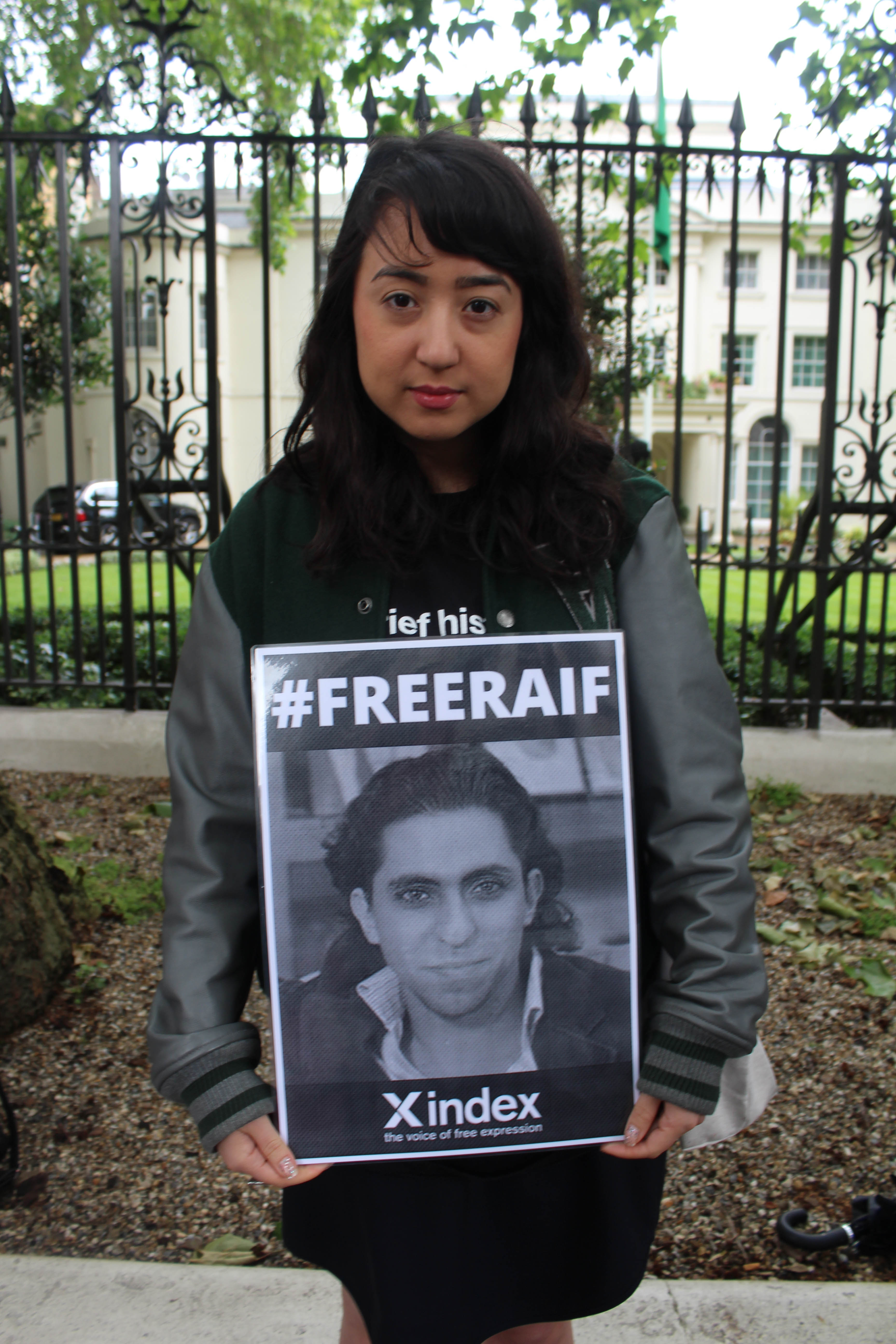
Credit: Cat Lucas, English Pen
Hannah Machlin, Project Officer, Index on Censorship
“We are here in solidarity with Raif. Index on Censorship is particularly concerned with his public lashings, the second set of which has been delayed due to his health problems. If the Saudi government conducts the rest of his lashings in private, as they said they will, there are much more opportunities for abuse. He may not survive and this is why we must not turn a blind eye.”
17 Jun 2016 | Azerbaijan, Azerbaijan News, Europe and Central Asia, European Union, France, Italy, Mapping Media Freedom, News and features, Russia, Turkey
Click on the dots for more information on the incidents.
Each week, Index on Censorship’s Mapping Media Freedom project verifies threats, violations and limitations faced by the media throughout the European Union and neighbouring countries. Here are five recent reports that give us cause for concern.
A Baku prosecutor asked for an 8.5-year sentence for Rovshan and Rufat Zahidov, relatives of Azadliq (Radio Liberty) newspaper editor-in-chief Ganimat Zahid on charges of drug possession, the media outlet reported. Rufat and Rovshan Zahidovs were arrested in July 2015 and accused of the possession and sale of drugs. The hearing of the case began in February 2016. Ganimat Zahid lives in exile and runs Azerbaijan Hour online TV channel. Zahid served 28 months of a four- year sentence in retaliation for his critical journalism wrote CPJ following Zahid’s release in 2010. Zahid was convicted under articles 127.2.3 (hooliganism with intentional infliction of minor bodily harm) and 221 (hooliganism).
Police forces pushed, shoved and hit journalists with batons while dispersing a protest against the proposed labour law in Rennes, France 3 reported. The police charged the crowd from their cars, using tear gas against protesters and hitting them with batons, France 3 reported. Bruno Van Wassenhove, a France 3 reporter, explained journalists who had been criticising the violence of the assault were pushed to the side by the police officers and hit intermittently with batons. Rennes Press Club has firmly criticised the attacks against journalists perpetrated by the police. “Journalists were not targets but ‘they were hit by batons'”, the Club wrote on twitter, quoting an article of newspaper Le Parisien.
Editor Pasquale Clemente was sentenced to two years in prison and fined €1,500 on libel charges (Art. 13 of the press law n.47 /48) in the criminal court of Nola in Naples, Ossigeno reported. Clemente is the former editor-in-chief of the Gazzetta di Caserta and currently editor-in-chief of Roma newspaper. On 22 July, 2010, Pasquale Giuliano, a former judge and senator at the time, sued the journalist for an article published on 30 April, 2010 edited by Clemente. In that article, Clemente criticises the politician: “A province like ours – he writes – can not afford to blow up the first Provincial Council …. A shame ratified by threats from the courtroom of two parliamentary politicians like Coronella and Giuliano, who had nothing to do with anything”.
Journalists Aleksandr Valov and Dmitry Saltykovsky along with a film crew for US channel HBO were detained while working near the southern Russian city of Sochi. The Russian journalists and the six-person TV crew were reportedly investigating claims of misuse of real estate properties constructed during the 2014 Winter Olympic Games which were held in Sochi. The US citizens were released after seven hours, while the two Russian journalists were detained further and transported to the FSB headquarters in Sochi. Initially, law enforcement claimed they were operating in a near-border zone without “necessary permits.” Valov’s lawyer reports that a court in Adler charged him with “organising a public event in a near-border zone.” Valov is set to remain in jail for five days. Dmitry Saltykovsky, who worked as an interpreter for the HBO crew, was released, but fined 1,000 rubles ($15), according to the journalists’ lawyer, Alexander Popov, on Twitter. Aleksandr Valov is the editor-in-chief of Blog Sochi.
Syrian independent journalist Ahmed Abd al-Qader survived second murder attempt in Urfa, where he is based. Exiled Syrian news outlet, Eye on Homeland, said, Ahmed Abd al-Qader was attacked while out shopping by two gunmen riding a motorbike, RSF reported. Injured in the head, he was taken to a hospital in Urfa and is now placed in intensive care and is reportedly in stable condition. The attack was claimed by the Islamic State according to ABC news. In March of 2016, Ahmed Abd al-Qader survived a first attempt at his life when two men ambushed his residence in Urfa. His brother Ibrahim Abdelqader was murdered in Urfa on 30 October 2015 together with a friend, Fares Hammadi, which the Islamic State also claimed responsibility for. In April, another Syrian journalist Mohammed Zahir al-Shergat died as a result of gunshot wounds in Turkish city of Gaziantep. Shergat was shot when walking on a street by members of the IS, who have since confirmed their responsibility of the attack.
17 Jun 2016 | Angola, News and features, Statements
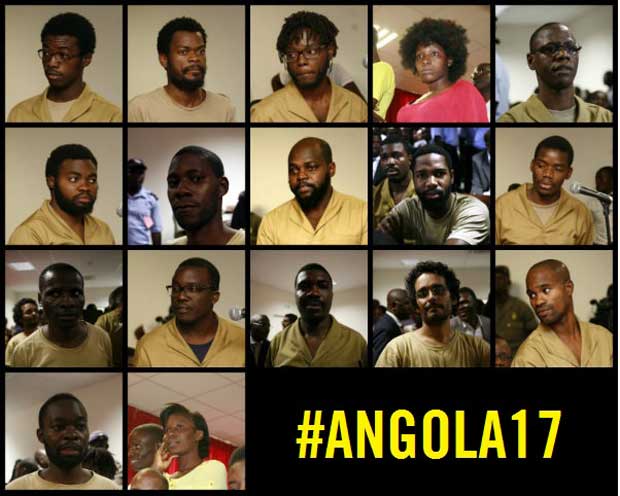
Demonstrations are being held in Brussels, Luanda, Pretoria and Paris to mark one year since the arrest of an Angolan book club’s members.
20 June has been named Liberation Day in solidarity with the group of 17 young men who received sentences between two and eight-and-a-half years in March. They were convicted of preparing acts of rebellion and conspiring against the government.
The majority of the group (15) were were arrested last June while holding a meeting to discuss politics and democracy in the country, which has been ruled by President Eduardo dos Santos for 36 years. They had been reading a book about non-violent resistance by Nobel Prize nominee Gene Sharp.
Relatives, human rights groups and the press have reported severe concerns about the prisoners’ deteriorating health.
Rapper Luaty Beirão has attempted to protest his five-year sentence with a hunger strike. Friends managing his Facebook said that he has recently been experiencing intense fevers and the Portuguese press has reported he is being treated for malaria.
Nuno Dala, a university lecturer who is part of the jailed group, also carried out a 36-day hunger strike after packages sent to him from relatives failed to be delivered and he was refused access to books. Last month saw the release of Dala’s own book, The Political Thought of Young Revus: Speech and Action, which he was working on when he was arrested. The launch coincided with his daughter’s first birthday.
Amnesty International, which has declared the 17 as prisoners of conscience and launched a petition to demand their release, said, “They should not have spent a single day in prison and must be released immediately and unconditionally.”
The 17 jailed activists are Henrique Luaty da Silva Beirão, Manuel Chivonde (Nito Alves), Nuno Álvaro Dala, Afonso Matias (Mbanza Hanza), Nelson Dibango Mendes dos Santos, Hitler Jessy Chivonde (Hitler Samussuko), Albano Evaristo Bingobingo, Sedrick de Carvalho, Fernando António Tomás (Nicolas o Radical), Arante Kivuvu Italiano Lopes, Benedito Jeremias, José Gomes Hata (Cheick Hata), Inocêncio Antônio de Brito, Osvaldo Sérgio Correia Caholo, Domingos da Cruz, Laurinda Gouveia and Rosa Conde.
Details of the worldwide protests on and around Liberation Day can be found here
